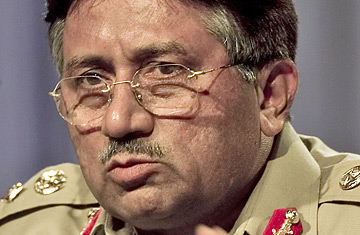
Pakistani President Pervez Musharraf
Osama bin Laden may not have the religious authority to issue a fatwa, but for some in Pakistan, his declaration of war against President Pervez Musharraf carries the same weight as a papal excommunication. More importantly, though, bin Laden's denunciation of General Musharraf as an "apostate leader" is a jihadist echo of the charge by secular opponents that the general's efforts to hold on to power are illegitimate.
Bin Laden's statement came on the same day that Pakistan's Election Commission announced the date for Pakistan's parliament to elect a new President — a vote in which Musharraf plans to seek a second term. But, for the past week, the Supreme Court has been considering several legal challenges to Musharraf's authority: There's the question of whether the constitution allows him to seek a new term as President while remaining in command of the military; there are contempt-of-court proceedings over his government's deportation of opposition leader Nawaz Sharif despite a court ruling allowing him to return from exile; and then there is the question of whether the President can be reelected by a lame-duck assembly due to be dissolved by January pending new elections.
The most contentious case is over Article 63 of the constitution, requiring that candidates for elected office, among other things, must have been retired from the military for at least two years, so as to prevent the power and influence of the military being brought to bear on the democratic process. Yet, on Sunday, Pakistan's government-run electoral commission ruled that Article 63 no longer applies to presidential candidates. But even if Musharraf's candidacy for a second term is deemed lawful, several opposition party members have warned that if he runs uncontested — and no other candidates have stepped forward thus far — his election would be illegitimate. Not so, say members of his government. "The reason why there is no presidential candidate against Musharraf is because President Musharraf enjoys the confidence of the majority of the electorate," says Senator Nisar Memon, Chair of the Senate Standing Committee on Defense. What is illegitimate in his view is trying to prevent Musharraf from running.
In what some lawyers and analysts see as an attempt to preempt a supreme court decision declaring him ineligible to run for President, Musharraf, through his lawyer, promised the court on Tuesday that if reelected by the parliament, he would step down as army chief before being sworn in on November 15. It's a promise that rings hollow to some, and one that has been heard before. In 2002 Musharraf promised that he would step down as army chief in exchange for a one-time exemption to the very same article 63, citing the ongoing political tensions. Back then, he had the support of the Pakistani people. Now, many have lost faith. "It's a joke, nobody believes it," says Ayesha Tammy Haq, a lawyer and a prominent political talk show host. "If he takes off his uniform he is nothing. The subtext here is, 'You elect me President, or it's martial law.'" "
The threat of martial law has been made explicit by Railways Minister Sheikh Rashid. "If the opposition adopts an extremist policy [by resigning from parliament over Musharraf's bid to be reelected in uniform]," he told a press conference, "it could lead to extreme decisions [by the government] which could be unfortunate for the country."
Martial law would certainly have far-reaching consequences: In addition to the suspension of the constitution, parliamentary elections, due by January, would be postponed at least another year. Opposition parties, already weakened by the secondary role to which they've been reduced in almost eight years of rule by the general, would likely lose support to more extremist opposition groups.
So, the threat of martial law certainly gives parliamentarians, politicians and Supreme Court justices pause to consider whether a weakened, but still functioning, constitutional democracy may be preferable. But Musharraf may be restrained from the martial law option by its potentially devastating consequences: It would force those looking to unseat him to take to the streets and confront the state, and if that forced the military to fire upon fellow Muslims, nothing would make Osama bin Laden happier. In his audio tape released on Thursday, bin Laden said that Musharraf's government and soldiers were "all accomplices in spilling the blood of those of the Muslims who have been killed" during July's siege against the militant Red Mosque in Islamabad.
According to most interpretations of Islamic law, jihad is only justified against an invader that supplants a lawfully chosen leader — the Soviets in Afghanistan, for example. Even according to Abdul Rashid Ghazi, the radical Red Mosque leader who was killed during the siege, jihad did not apply to the situation in Pakistan because Musharraf, hated as much as he might have been, was at least a legitimate President. "But," he warned, "the minute Musharraf's army spills the blood of the Pakistani people just to keep him in power, he is no longer legitimated. Then jihad will be allowed in Pakistan."
Bin Laden's declaration that Musharraf is an infidel who has spilled Muslim blood further cements his illegitimacy in the eyes of the militants leading an insurgency in the mountainous tribal areas between Pakistan and Afghanistan. They may care little for the intricate political maneuverings of courts and lawyers far away in the capital, but if martial law were to be established, it wouldn't just be war against Musharraf, but jihad against the entire government. And if the Pakistani state found itself at war with a significant section of its own people, its effectiveness as an ally in the war on terror would end.
